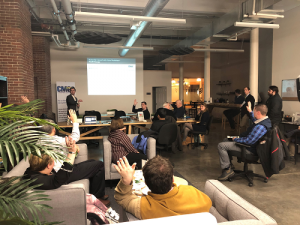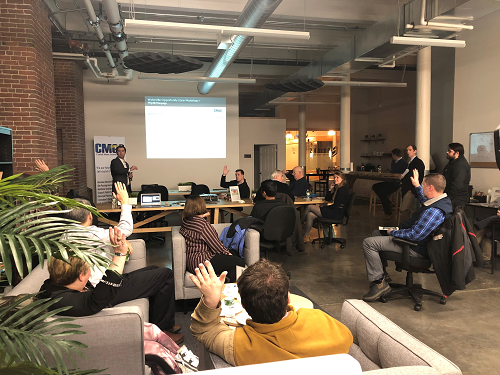
A Central Maine Tech Night presentation on Opportunity Zones (OZ) organized by CMGC and hosted at Bricks Coworking & Innovation Space. Waterville’s OZ and coworking space were critical factors in CMGC’s successful application to the Rural Innovation Initiative.
Rural Innovation Strategies, Inc. (RISI), today announced that Central Maine Growth Council (CMGC), a public-private economic development organization serving Waterville, Winslow, Oakland, and Fairfield, has been chosen in a highly competitive process to participate in the 2020 Rural Innovation Initiative. CMGC is the only New England-based organization this year to participate in the national technical assistance program which supports rural communities working to create digital economy jobs with an innovation hub strategy.
The initiative is made possible through a cooperative agreement between RISI and the U.S. Economic Development Administration. In addition to the EDA, the Siegel Family Endowment and Walmart are providing funding for the initiative. Rural LISC and Venable LLP are strategic partners.
“Central Maine Growth Council is doing an impressive job of cultivating the conditions for downtown and mid-Maine vibrancy,” said Matt Dunne, Executive Director of RISI and Founder of the Center on Rural Innovation (CORI). “We’re excited to partner with CMGC as they continue to harness regional assets to grow a knowledge, technology, and innovation economy with opportunities for talented workers and entrepreneurs in mid-Maine.”
“Small businesses and entrepreneurs are at the core of Maine’s rural economy and will drive its success,” said Governor Janet Mills. “I congratulate Central Maine Growth Council on this prestigious award, which is a testament to their work to strengthen our economy. I look forward to the economic growth that it generates in the months and years to come.”
CMGC and other Rural Innovation Initiative participants will receive a range of support, from on-site and video conference time with RISI staff to opportunities for collaboration with similarly motivated communities, as well as templates and written resources as they execute an innovation hub strategy: an economic development model that works to educate and train local residents in digital skills, employ them in new economy jobs, and empower them to launch the startups that will drive their digital economies.
RISI will work with CMGC and other participants to identify and prepare for federal and other funding opportunities that fit their unique attributes and goals. Given the strong foundation of partnerships and investment in mid-Maine, CMGC will utilize the Rural Innovation Initiative to prepare for an application to federal funding opportunities, including the Regional Innovation Strategies program. Participants will also have access to significant technical assistance to refine their economic development strategies, help them identify partnerships, and leverage existing resources.
“The Rural Innovation Initiative model for building a digital economy ecosystem strongly aligns with the current and planned investments for the downtown, Waterville, and mid-Maine region,” explained Garvan D. Donegan, director of planning and economic development for Central Maine Growth Council. “Entrepreneurs and large technology firms alike have found mid-Maine’s blend of pre-K through graduate degree/program education, outdoor recreation, and thriving arts, culture, and culinary scenes to offer a powerful foundation for business growth, and we look forward to strengthening and compounding our assets through the Rural Innovation Initiative.”
“Five years ago, in partnership with the city of Waterville and many others, Colby planned a series of investments to ensure both the College and community would grow together to create a stronger mid-Maine,” said Brian Clark, vice president of planning at Colby College. “Participation in the Rural Innovation Initiative is another sign that this partnership model is having a significant impact, and can serve as a blueprint for other communities to follow. We’re eager to continue partnering with the Growth Council and others to advance strategies that further the region’s innovation economy and drives job creation.”
The Rural Innovation Initiative launched in 2019 with nine participant communities. In its first year, the Initiative catalyzed $5.3 million in new investment in rural innovation hubs. More than 110 communities from 37 states and Puerto Rico submitted requests to participate in the technical assistance program this year.
The other 2020 Rural Innovation Initiative participants are:
- Ada Jobs Foundation, Ada, Oklahoma
- Southern Utah University Business Resource Center, Cedar City, Utah
- Southwest Colorado Accelerator Program for Entrepreneurs (SCAPE), Durango, Colorado
- Innovate Marquette Smartzone, Marquette, Michigan
- Shaping Our Appalachian Region (SOAR), Pikeville, Kentucky
- University of Wisconsin-Platteville, Platteville, Wisconsin
- Shawnee State University, Portsmouth, Ohio
- Staunton Creative Community Fund, Staunton, Virginia
- Taos HIVE, Taos, New Mexico
“Momentum is building in small towns across the country for new strategies that leverage local assets and support sustainable economic success,” said Dunne. “These communities are taking forward looking approaches that foster entrepreneurship, catalyze startups, and support strong local digital economy ecosystems. We are excited to work in conjunction with EDA and these communities to change the narrative about what’s possible in rural America.”
Participating communities were selected because they are in designated rural counties according to U.S. Census definitions or consortiums of rural communities in close geographic proximity to one another. Successful communities have a combination of the following attributes:
- Existing high-speed broadband;
- Available real estate, or significant portions of the community located in Opportunity Zones and/or New Market Tax Credit census tracts;
- A relationship with a four-year endowed residential college or university campus willing to partner in this effort; and
- A nonprofit organization prepared to lead the initiative.
RISI is also creating a virtual network to support capacity building, link innovation hubs, enable communities to make connections to new sources of capital, expand their networks with national technology leaders, and secure digital economy jobs for remote workers in their communities.
RISI works with its sister organization CORI to achieve sustainable economic success in small town America. The first round of the Rural Innovation Initiative in 2019 catalyzed $5.3 million in new investment in rural innovation hubs in three small towns and brought nine communities into the virtual network. CORI developed and regularly updates the Rural Opportunity Map, a suite of data visualization and mapping tools to help local leaders, national policymakers, investors, and donors see the potential in rural America.
Last modified: January 10, 2020








